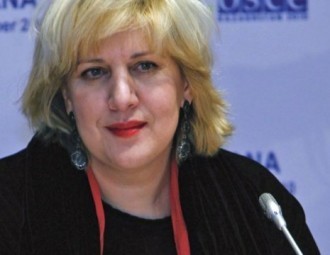Dunja Mijatović: Obligatory accreditation of journalists in Belarus has to be abolished

It greatly restricts the possibilities of the media, stated the OSCE Representative on Freedom of the Media.
During a two-day official visit to Minsk OSCE Representative on Freedom of the Media Dunja Mijatović strongly encouraged the authorities to continue working to improve the media freedom situation in Belarus.
She keeps mentioning the problems when contacting the Belarusian authorities, Mijatović stressed. She recalled her visit to Belarus in 2013: “I asked the government to do everything possible to lift charges form journalists and it finally happened. There are no imprisoned journalists in Belarus at the moment.” As Euroradio writes, she meant the criminal cases started against Andrzej Pochobut, Iryna Khalip, Natalia Radzina and Anton Surapin.
Besides the abolishment of obligatory accreditation, it is necessary to reform the Law on Mass Media and access to information in Belarus, the OSCE representative thinks. Internet freedom is also an important issue, she stressed.
“I voiced my concern about the serious challenges that media continue to face in Belarus,” is said at the official page of the OSCE Representative on Freedom of the Media. “Noting positive developments, there is still a need for the authorities to show more political will to comply with international standards on free expression and free media.”
In discussions with Foreign Minister Uladzimir Makei and Minister of Information Lilia Ananich, Mijatović emphasized the need for immediate reform of the restrictive media law. She also stressed the importance of changing accreditation requirements for journalists and introducing more effective ways to access information.
“The time has come to ease pressure on media in Belarus. I will continue to closely monitor the working conditions of media outlets and I will continue raising my voice to defend Belarusian journalists,” Mijatović said.
Mijatović reiterated the readiness of her Office in providing expert recommendations, in line with OSCE media freedom commitments and best practices, and insisted on the urgent need to engage civil society in discussions on the reform process.
-
03.01
-
07.10
-
22.09
-
17.08
-
12.08
-
30.09








































